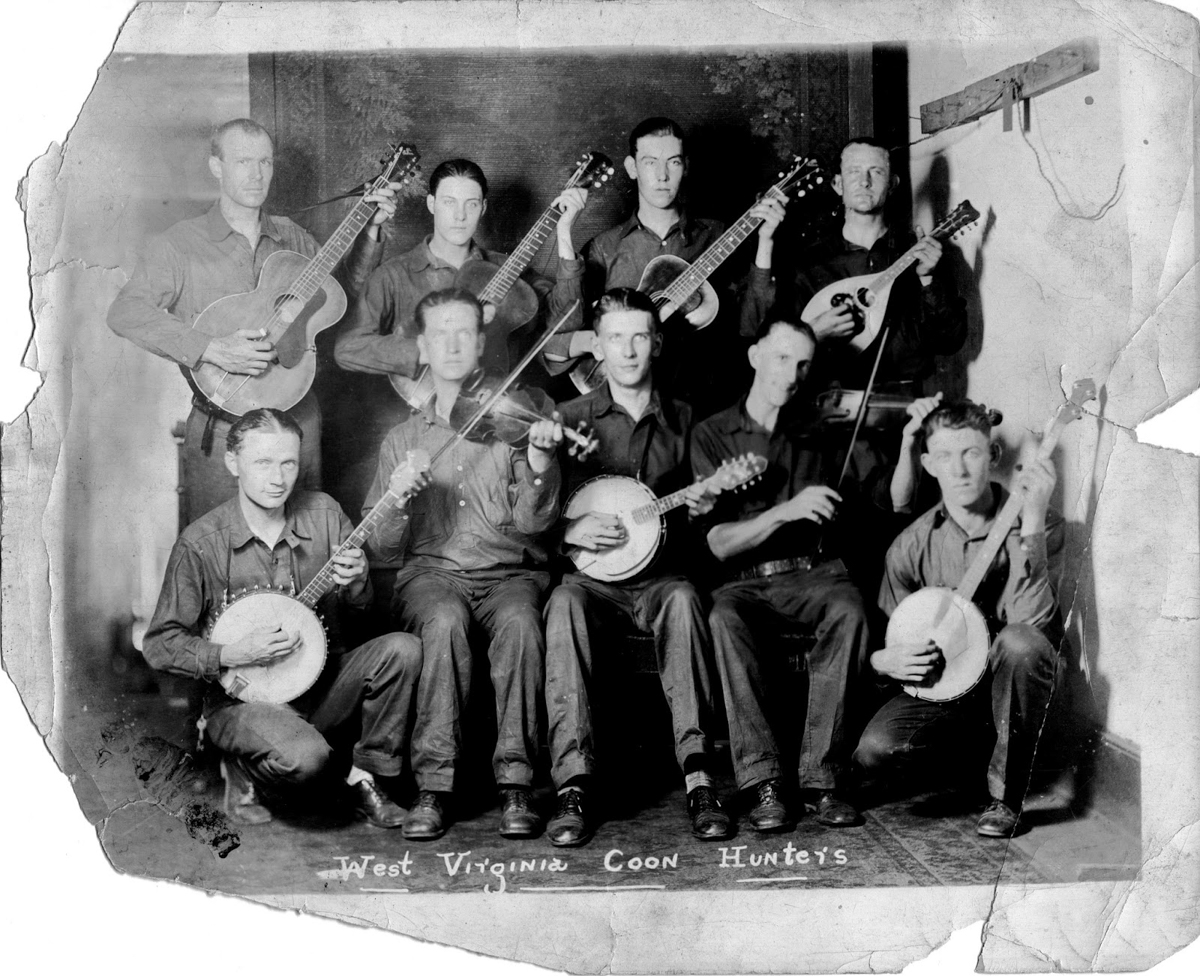West Virginia marks its admission to the Union on June 20, and with this anniversary, it is common practice to celebrate all the contributions West Virginians have made in history through the decades. There are many contributions for us to be proud of, but the ones that are closest to my heart are those made by a few men from Bluefield and Mercer County that became part of the history of the birth of country music.
In 1927 Ralph Peer, a talent scout and recording engineer for Victor Talking Machine Company, searched the south, including Appalachia, for new talent. After setting up a makeshift recording studio in Bristol, Tennessee-Virginia, he spent two weeks with various singers and musicians that came out of the mountains for a chance to record. Today when people think of the Bristol Sessions they often think first of Ernest Stoneman, The Carter Family – known as the First Family of Country Music – and Jimmie Rogers – referred to as the Father of Country Music – but all the musicians who recorded there still influence music today.
West Virginia was part of that important history – the state was represented at those recordings by Blind Alfred Reed and the West Virginia Coon Hunters.
Alfred Reed was born blind in 1880 in Floyd County, Virginia, the son of Riley and Charlotte Akers Reed. According to census records, they originally hailed from the Alum Ridge/Indian Valley area of Floyd County, Virginia. Their family, like others, migrated to Bluefield, West Virginia, in search of work. Bluefield was central to the coal boom, especially since it was a railroad hub, and it brought many workers to the coal fields from other areas. In 1927, the year of the Bristol Sessions, Reed and his wife Nettie and several of their children were living in Bluefield on Lilly Road. They are listed in the 1927 Bluefield City Directory with Reed’s occupation noted as music teacher. He made his living playing music long before the Bristol Sessions.
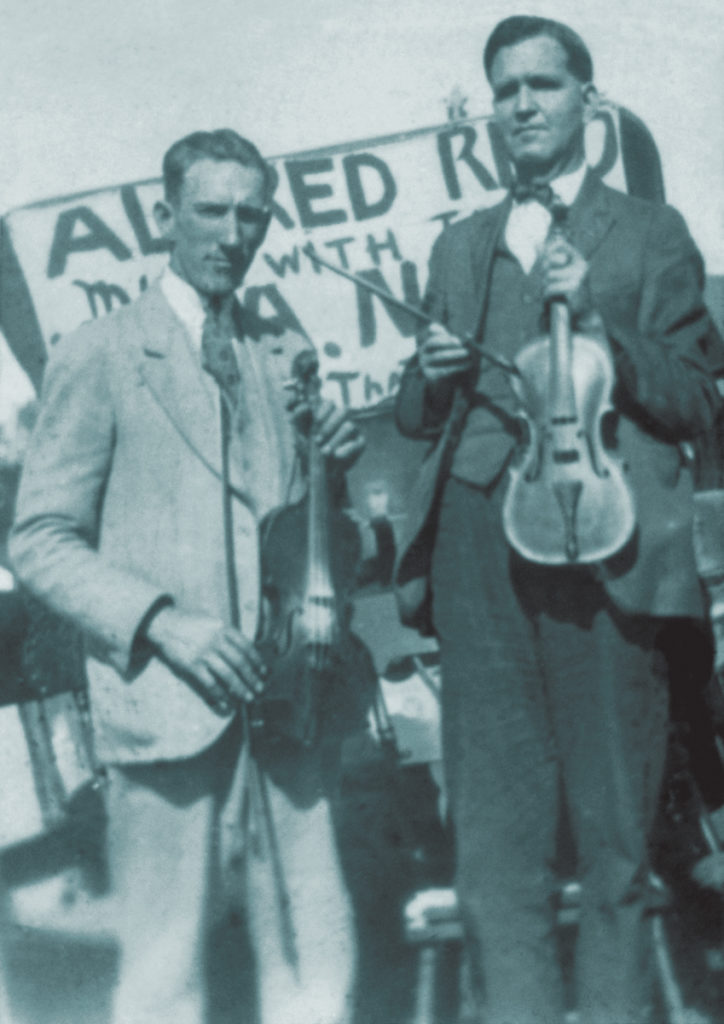
There has been a lot of speculation about the many ways that all that musical talent came to Bristol in 1927. Were they brought there by advertising, handbills, or word of mouth? Newspaper and obituary accounts recount that Ralph Peer attended a convention around this time – presumably a fiddlers’ convention – and heard Blind Alfred Reed’s rendition of “The Wreck of the Virginian.” It makes sense that Peer, as a talent scout, would go to where music was being played in the summer of 1927 and invite musicians too. I would argue that invitation could have been one of the methods to bring musicians to Bristol because of the type of music he seemed to be looking for and the type of music he ended up recording. And so Peer, after hearing Reed, might have invited him to Bristol.
The song “The Wreck of the Virginian” would have personal appeal for Reed. Several of his family worked for the railroads. For instance, his brothers Monroe and Matthew Reed worked for the B&O Railroad. His son Collins D. Reed is listed in the 1927 Bluefield City Directory as living with him and working as a machinist for the Virginian Railway Co. His other son Arville Reed, who played guitar on three of the songs at Bristol, is also listed in the 1927 Bluefield City Directory as living with him and as working as a brakeman on the B&O Railroad. Arville’s name is misspelled as Orville in several records.
Blind Alfred Reed recorded four songs for Peer: “The Wreck of the Virginian,” “I Mean to Live for Jesus,” “You Must Unload,” and “Walking in the Way with Jesus.” Reed continued recording until 1929, the year when his most famous side was released: “How Can a Poor Man Stand Such Times and Live?,” a song that has been modified and sung in modern times by musical artists such as Bruce Springsteen and Ry Cooder.
We don’t know the reason why Reed quit recording in 1929 – there is only speculation on that front – but we do know that he still played music locally and became a lay preacher for the Methodist church. He and his family moved around Mercer County, and for a time, he was a street musician in Princeton until the city created an ordinance against busking in 1937. Today there is a mural in his memory on Main Street in Princeton and so he has become a permanent fixture on the street he was once forbidden to play on. Blind Alfred Reed died in 1956 and is buried in Elgood, West Virginia; in 2007 he was inducted into the first class of the West Virginia Hall of Fame.
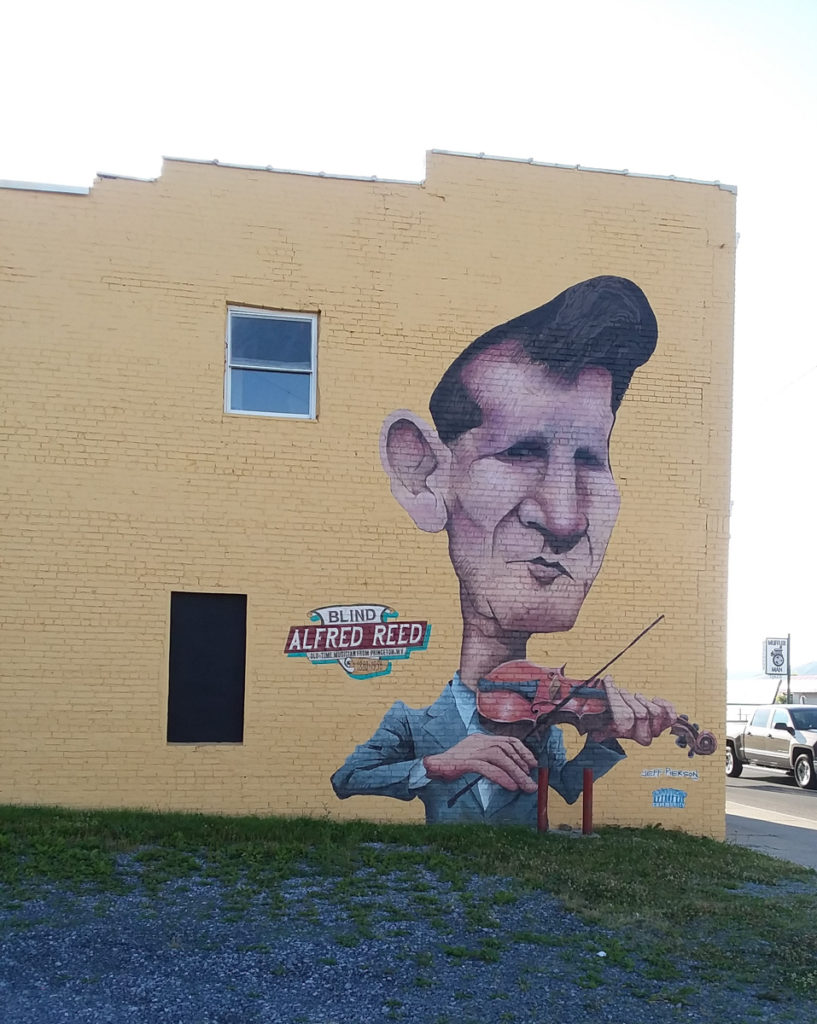
Most members of the West Virginia Coon Hunters also hailed from Bluefield and the surrounding area, many migrating there for the same reasons as Reed’s family. The band recorded two songs on August 5, the last day of the 1927 Bristol Sessions: “Your Blue Eyes Run Me Crazy” and “Greasy String.”
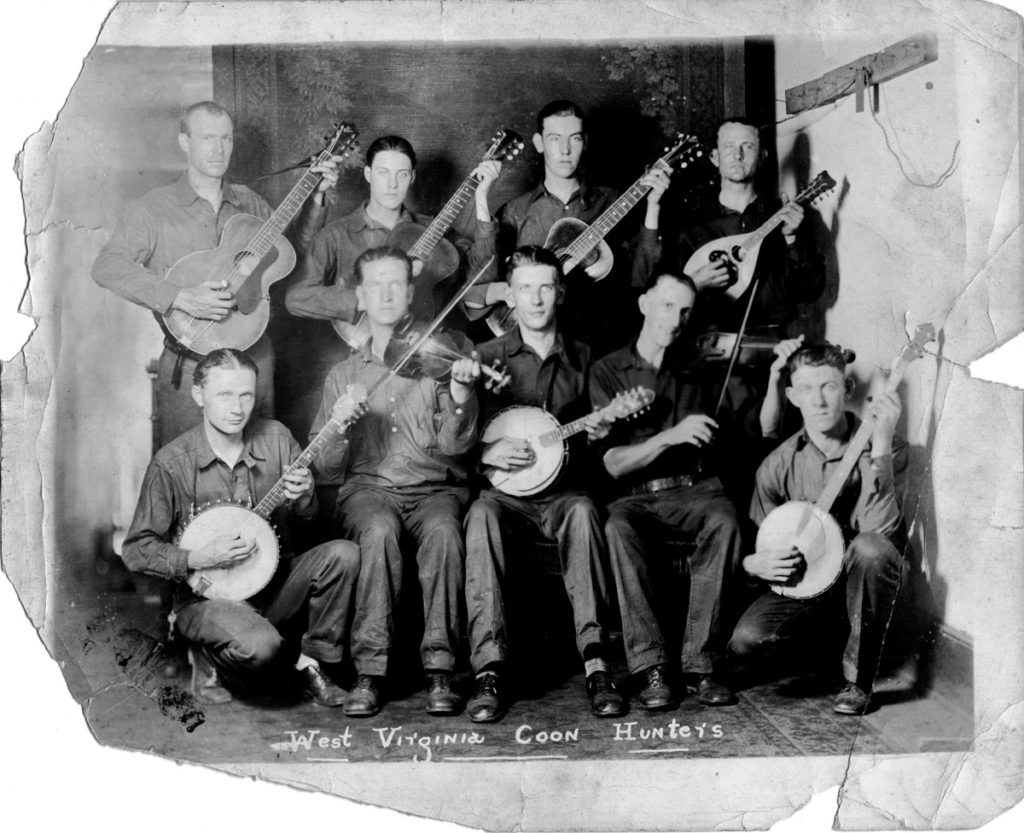
There are several pictures of the West Virginia Coon Hunters from this time. One is the large group photo of nine musicians seen above, but several simply show four of the men and the full group didn’t play on the songs recorded at the Bristol Sessions. The record has Clyde S. Meadows and my grandfather Wesley “Bane” Boyles included on its label – they are also in the pictures of the smaller group and the large group. However, the record has Clyde’s name as C. A. Meadows (and on the session sheet it is mis-written as W. A. Meadows), while on one side of the record, W. B. Boyles was misspelled to W. B. Bayles.
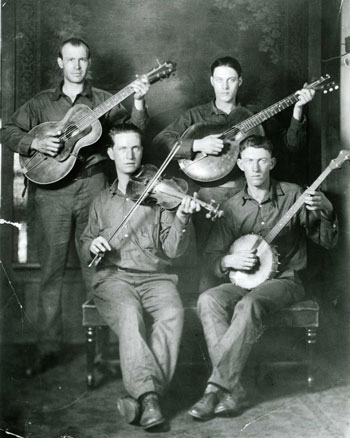
I’ve tried to track down the personal histories of where each of the members of the band was living in 1927. Several of the band members had migrated to West Virginia, and all of them seemed to be living in and around Mercer County – many were found in the 1927 Bluefield City Directory or had connections to Bluefield. Most continued to play and influence music here in this region for generations.
Wesley “Bane” Boyles, my grandfather, was born in Bland County; in 1927 he was living in Bluefield at 501 Rogers Street with his parents and brothers. He was a moonshiner by occupation so unsurprisingly there was no occupation listed in the 1927 Bluefield City Directory! To read more of his story, check out my own blog.
In 1927 Clyde Meadows is listed as living at 717 Hardy Street in Bluefield. His occupation was noted as engine cleaner for the Norfolk & Western Railway. More of his story can be found in the Spring 2003 issue of Goldenseal Magazine in an article by John Lilly entitled “The West Virginia Coon Hunters: On the Trail of a Lost String Band.”
Vernal Leonidas Vest was a mandolin and ukulele player. He was a true son of West Virginia, born in Summers County to Salunda Jackson and Emma Robbins Vest. In 1927 he was living in Oakvale, West Virginia, and the 1930 census has his occupation listed as a fireman on the railroad. His brother Robert Vest lived in Bluefield in 1927 and worked for the Virginian Railway. In 1930 and 1931 Vernal also recorded with fiddler Fred Pendleton’s West Virginia Melody Boys.
Fred Pendleton was born George Fredrick Pendleton to George Woodruff and Matilda Blankenship Pendleton in 1904 in Princeton, West Virginia; in the records he is listed as George Frederick or Fred G. Pendleton. In 1920 Pendleton was living with his parents on a farm in Oakvale, West Virginia, and by 1930, he was living in Princeton and also working for the railroad as a repairman on steam trains.
Pendleton is one of the most locally famous musicians after the 1927 Bristol Sessions, and he and Clyde Meadows continued to have recording careers as the West Virginia Coon Hunters for a while after they recorded in Bristol. Indeed, Peer asked them to return to Bristol to record again in 1928. Pendleton also recorded with Blind Alfred Reed and his son Arville for Victor later in 1927, as a group called the West Virginia Night Owls.
Pendleton can be found in newspaper articles and ads playing numerous events in West Virginia and beyond – everything from a reunion to a political rally, though my favorite is the Calico Frolic. In over 50 West Virginia news articles, his bands are listed playing events under many different names such as the Fred Pendleton Orchestra, Fred Pendleton’s Lilly Mountaineers, Fred Pendleton’s Swingsters, Fred Pendleton’s Hillbilly Band, etc. As long as his name was first, whoever joined him seemed to form a new band, at least for the event. He also was elected as a commissioner of Mercer County in the 1950s. He passed away in Princeton, West Virginia, in 1972.
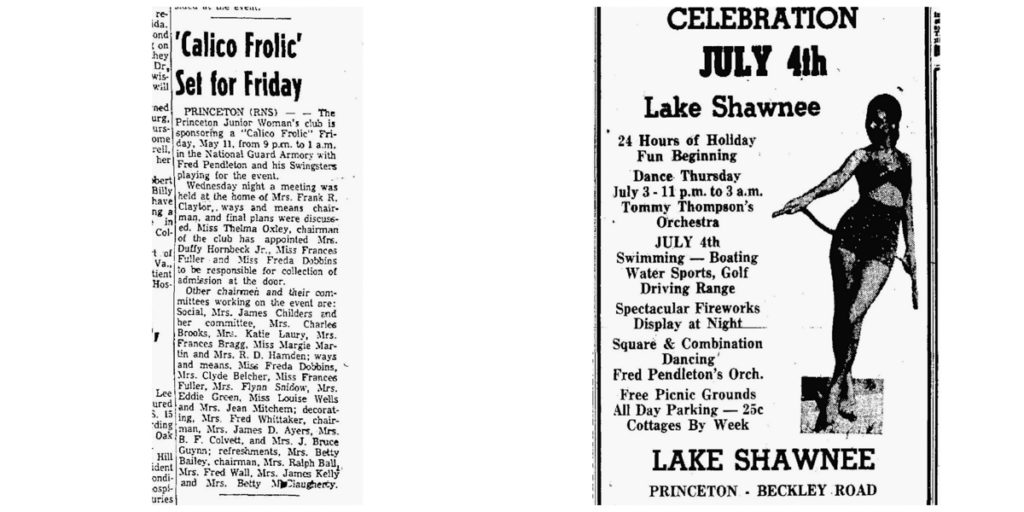
Regal Mooney was born Ovid Riggle Mooney in Tazewell County, Virginia, to Charles and Barbara Cruey Mooney. His father worked for the N&W Railway freight station in Williamson, West Virginia. In 1927 his father had passed and he was living with his mother and his wife Lake Palmer Mooney on Hale Street in Bluefield. His occupation at this time was listed as coil maker. I don’t have much information about his musical career, but he died in Columbus, Ohio, in 1973.
The rest of the band led to scanty information. Jim Brown worked for the Foley Printing Company and was also the music teacher at the Bland Methodist Episcopal Church in Bluefield. Joe Stephens – possibly Joseph H. Stevens – was a truck driver for Holt Brothers living at 305 Roanoke Street, a couple of blocks away from Fred Belcher at 113 ½ Roanoke Street, according to the 1927 Bluefield City Directory. And finally the most elusive band member: Dutch Stewart. I could find no one by that specific name though many Stewarts are listed in Bluefield and Mercer County during this timeframe.
Each of these men lived every day and ordinary lives, with music being an important part of those lives – and no matter their station in life, for a brief period of time, they came together in Bristol, Tennessee -Virginia and represented West Virginia at the “big bang” of country music.


